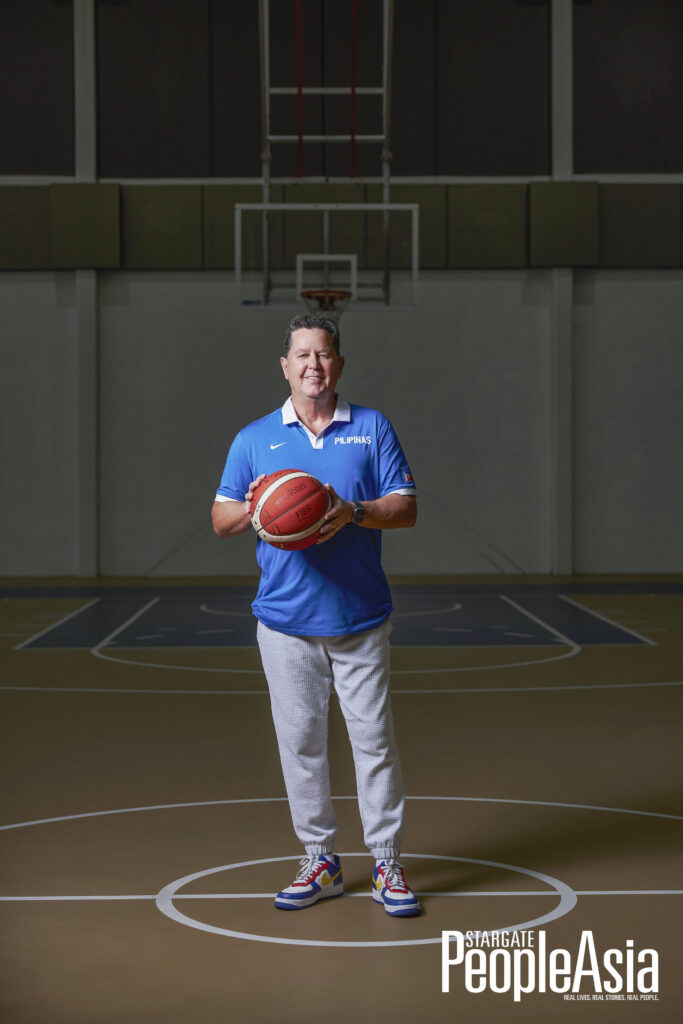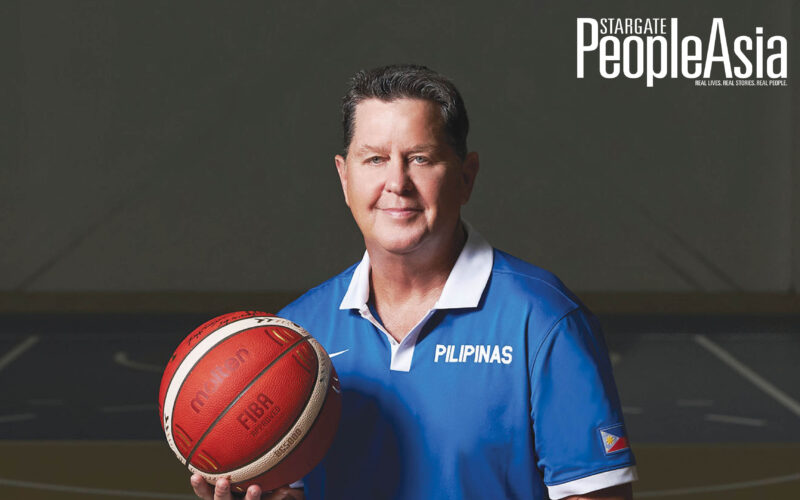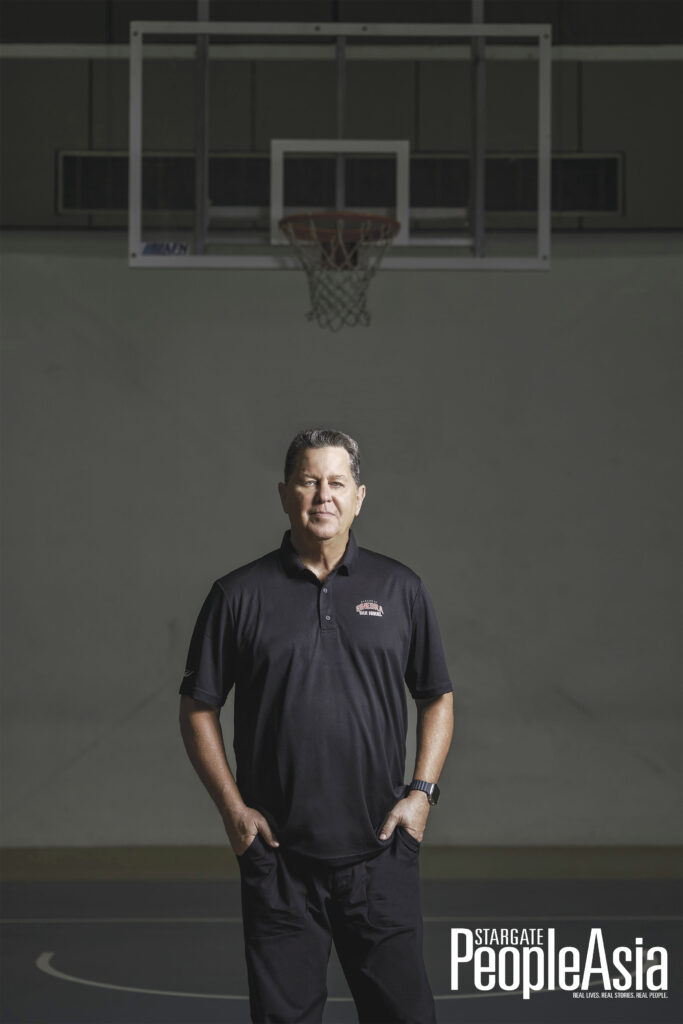BY JOHN BRYAN ULANDAY
From dozens of PBA cups to a recent gold at the 2023 Asian Games in Hangzhou, the Philippines’ winningest basketball coach continues to prove that he is one of the country’s G.O.A.Ts (Greatest of All Time) — without even having to claim it.
For many, Earl Timothy “Tim” Cone, better known as “Coach Tim” on- and off- court, is the G.O.A.T (Greatest of All Time), as far as basketball coaching in the Philippines is concerned. And while the seasoned ball tactician begs to disagree, his track record says it all.
In 2023, Cone secured a Philippine Basketball Association (PBA) championship against a foreign guest team led by legendary Australian mentor Brian Goorjian in front of a record-breaking crowd; served as an assistant coach for Gilas Pilipinas in the Southeast Asian Games and the prestigious FIBA World Cup and, of course, led a historic gold-medal feat in the Asian Games as head coach of the Philippine team.
Some would say it was a banner year for Cone, who turned 66 last Dec. 14. Again, he disagrees. “I don’t really think about banner years because I always feel like my best championship is my next championship,” says Cone. “I’m not too focused on what already happened. I’m a guy who always focuses on moving forward and putting things behind and taking up the next challenge.”
Cone started his year by coaching Ginebra to the 2023 PBA Commissioner’s Cup title at the expense of the Bay Area Dragons, the first foreign guest team in the country since the University of British Columbia Thunderbirds and US Pro-Am Selection in the 2004 PBA Fiesta Conference.
Bay Area, a Hong Kong-based squad mentored by Brian Goorjian, who just steered the Australia men’s national basketball team to the country’s first bronze medal at the 2020 Tokyo Olympics, rammed through the PBA opposition and topped the elimination round marked by blowout wins one after another.
That was until Cone and the Gin Kings stood in the way. In the end, Barangay Ginebra finally beat its opponent 114-99 in Game 7 in front of 54,589 fans. “It’s special. He’s a legend [Goorjian] and being able to go head-to-head against him in the series and being able to win that last game in front of more than 50,000 fans. That means a lifetime of an accomplishment right there,” beams Cone, as he speaks of his 25th PBA title.
Shortly after, Cone signed on as assistant coach to Chot Reyes for Gilas Pilipinas for the SEA Games in Cambodia and the FIBA World Cup, which was held in the Philippines. While the team only secured one win at home (earning it a ticket to the FIBA Olympic Qualifying Tournament for the 2024 Paris Olympics), it managed to reclaim the gold medal in the SEA Games in Cambodia.
To many, though, Cone’s defining moment in 2023 would have to be his stint as head coach for the Philippine team during the Asian Games. Despite taking over from Reyes on short notice, Cone eventually led the team to a gold medal — its first since 1962.
Cone, who also coached the 1998 Philippine centennial team that last won an Asian Games (bronze) medal, fittingly authored the country’s return to continental basketball supremacy. Under his watch, Gilas had a historic run, including a 77-76 comeback win (from 20 points down) against no less than tournament host China in Hangzhou.
Winningest coach
Cone is the winningest coach in PBA history, with 25 titles, including two grand slams, to his name. His first triple crown was with Alaska in 1996 and then San Mig Coffee (now Magnolia) in 2014.
He’s the only coach in PBA history with over 1,000 career wins. He’s won “Coach of the Year” five times. Overseas, he has gold medals in the SEA Games and William Jones Cup, plus a bronze in the Asiad.
And now, a gold medal from Asia’s biggest court.
“We took the plunge and went after it. I’ll say this a million times, we did not think we were going to win the gold medal. That was our goal but we didn’t think we would actually do it,” says Cone after Gilas exacted revenge on Jordan, which beat them in the eliminations, with a 70-60 win in the finals.
“The fact that we did, and I could say that for all the players, we just kept it putting one foot in front of the other and in front of the other and suddenly, we’re playing in the gold medal game. I think we shocked ourselves just as much we shocked the country by winning that for the first time in 61 years. What an accomplishment for our guys,” says Cone of the team led by his Ginebra resident import and Gilas naturalized player Justin Brownlee.
Cone has been with so many fabled franchises like Alaska, Magnolia and Barangay Ginebra in the PBA that if you asked him, he would never be able to choose his favorite.
“Each team takes a personality of its own,” says Cone, who won 14 titles with Alaska, five with San Mig and now seven and counting with Ginebra.
But coaching the Philippine national team holds an incomparable place in his heart.
“It’s a great year. It certainly rivaled or surpassed the grand slams. The grand slam is for our organization but playing for the country was really special,” Cone explains. “Of course, I never thought of doing it again in the Asian Games and being able to represent the country again. When you represent the country, you’re doing something much larger than yourself. And when you’re doing something much larger than yourself, that makes it more special than anything else you could ever do.”

— Coach Tim Cone
Beyond the hard court
Believe it or not, Cone never dreamt of being in basketball, much less being a coach.
But life had other plans for the American kid who relocated with his parents in Baler (then part of Quezon) in the 1960s when he was nine years old.
“I was more into baseball and football when I was young. I didn’t really get to play basketball until I came to the Philippines,” recalls Cone, who spent his grade school years at the Baler Elementary School, upon landing in the hoops-crazed nation.
“My first year in the Philippines, I went to a public school for a year and basketball was the only sports we played. I started learning it.”
Cone became a full-hearted Pinoy from there on, even becoming a die-hard fan of Toyota back in its Manila Industrial and Commercial Athletic Association (MICAA) days and then the PBA. So Pinoy, in fact, that he never even watched the world-renowned National Basketball Association (NBA) from his home country until he studied there.
A foreigner who used to play with his Filipino teammates, Cone wanted to be an astronaut or a novelist, especially when he transferred to the International School of Manila and later studied at Menlo College in California, Los Angeles and George Washington University in Washington D.C.
“I worked for one year in the San Francisco area but I called my mom and I said I wanted to come home,” says Cone with a chuckle. Home, to him, was [and still is] the Philippines.
Back in Manila, he debuted as the head coach of his alma mater (International School Manila) in 1988 and the next thing he knew, he was already the head coach of Alaska Milk in the PBA starting in 1989.
Like the waters of Baler, the tides under the night sky turned Cone’s destiny and created ripples in his unrivaled legacy. “I ran into my good friend Fred Uytengsu (owner of Alaska) and he asked me to join and watch Alaska games,” Cone shares.
“One thing led to another and eventually, Fred just got tired of me telling him how to run his basketball team and so he said, ‘Okay, you do it.’ That’s how it started. But it was never my intention to coach except maybe a year before coaching in the PBA when I started thinking. ‘Maybe I can do this, maybe I can be good at this.’”
With the mentorship and influence of Baby “The Maestro” Dalupan, whom he considers the G.O.A.T, Norman Black, Robert Jaworski and foreign coaches in his college mentor, such as Bud Presley, Phil Jackson, Tex Winter and now Erik Spoelstra, Cone traversed a journey like no other.
Adopting the triangle offense of Winter, Cone revolutionized Philippine basketball in the 1990s enroute to collecting a hoard of championships.
From triangles to full circles
The triangle offense wasn’t the only iconic thing about Cone. Veering away from sporting official team polo shirts, Cone is also well-known for his coaching attire.
Clad in long sleeves, Cone and his entire coaching staff come into games like they are in for some serious business, as if they are headed to the board room for another day of hard work and life-changing decisions.
He doesn’t see it that way. If anything, it’s the complete opposite. “In the PBA, I’ve never worked a day in my life,” says Cone. “I enjoy what we’re doing so much that it doesn’t feel like work.”
In spite of the countless awards he has already amassed, Cone doesn’t see himself calling it quits anytime soon. “I don’t think it ever ends. Unless you’re going to retire and sit at home in front of your computer all day,” Cone reasons. “This is life right here.”
He also turns a tad emotional when he reminisces about the friendships he has established, on- and off-court. “I just hope my relationships with my players continue to grow. And I think more than anything, I’m emotional about the relationships with my players. I care about them,” adds the seasoned tactician, who handled different teams featuring the Philippines’ greatest players such as Johnny Abarrientos, Jojo Lastimosa, Ramon Fernandez, Alvin Patrimonio, James Yap, PJ Simon, Marc Pingris, Mark Caguioa, Jayjay Helterbrand, LA Tenorio and even June Mar Fajardo (whom he also considers a G.O.A.T).
Aside from being a genius coach, Cone is also a writer and a reader. In fact, the fervent fan of William Faulkner and Ernest Hemingway has already lost count of how many books he has read and memoirs he has written.
If the stars did not align the way they did, he would probably be a renowned writer by now.
In a way, he’s aware that there will be a time to close the book — even if he does not want to — no matter how riveting it is.
It’s not happening anytime soon, Cone himself declares, but when it does, he hopes for the story to carry the weight of his love for coaching. “I just hope that my legacy stands on its own,” Cone concludes.
How can it not?
Photography by Rap Yu
Art direction by Dexter Francis De Vera
Grooming by Kleng Totanes
Shot on location at San Miguel Corp. Sports Complex






